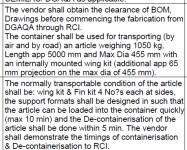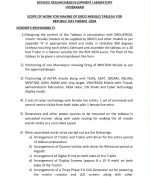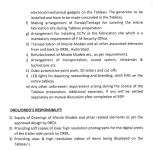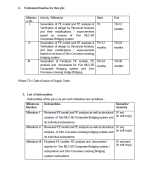Defence Research and Development Organisation (DRDO) : News and Updates
- Thread starter Ashwin
- Start date
DRDO in Dubai expo/show, they are showing the 2kw dew system there.
I doubt 1000 kg will be as effective since jets can carry far more 500 kg ones. The MKI could carry 8 instead of 3.
So EOI has been released for project ALW 2.
It will be air launched so I guess it must be rudra m2.
View attachment 20859
View attachment 20860
Just for ref quoting this, transportation for ALW-II being sought now. 5 meter, 1050kg and 455mm dia, with internally mounted wing kit, extra 65mm.
DcPP came out in the first half of the year and now may be ready


Top panel recommends shake-up in DRDO, bigger role for private players in defence research
The K. VijayRaghavan committee, set up for revamp of the DRDO, has submitted its report. An exclusive peek into its broad recommendations
The very start of 2024 is witnessing a shake-up in the country’s foremost defence research agency, the Defence Research and Development Organisation (DRDO). A high-powered committee, headed by former principal scientific advisor to the government Prof. K. VijayRaghavan and set up for revamping the DRDO towards developing high-end technologies for future warfare, has submitted its report.
The nine-member panel was scheduled to submit its findings by November 2023, but took an extra month to wrap up work.
While the government is maintaining secrecy about the report’s findings, multiple sources in the ministry of defence (MoD) indicated that in addition to its main agenda of suggesting ways to reform the DRDO and create an indigenous defence production ecosystem, the report also talks about giving a much bigger role to the private defence sector.
The report, according to sources, suggests that the DRDO’s role be limited to research and development without being involved in developing prototypes or technology demonstrators. Also, any production and further development should be done by selected private players or public sector undertakings.
The committee has recommended the setting up of close to 10 national-level laboratory facilities instead of the existing 40 or more DRDO labs across the nation. Besides, the setting up of five national test facilities has also been recommended, which will be open to private players for testing their weapons systems.
The recommendation of creation of national test facilities is in line with the government’s decision two years ago, which had allowed opening the DRDO’s doors to private players, wherein they get to operate government assets thus sparing them the need to invest in land, machinery or other support infrastructure.
As per the recommendations, the Prime Minister’s Office (PMO) may now be directly involved in key strategic projects. It is believed that the PMO has been keeping constant vigil on the DRDO, perhaps because a large section of the defence establishment believes the agency has not delivered to its optimal potential.
It is also believed that the panel has recommended the bifurcation of the post of secretary (research and development) in the MoD. The DRDO chairman currently holds this additional responsibility.
Besides restructuring and redefining the role of DRDO, the committee, which was set up in the last week of August 2023, was also tasked with finding ways to attract and retain high-quality manpower, including a system of project-based manpower through a system of incentives and disincentives, with strict performance accountability.
Many defence experts were apprehensive about the new panel, hoping it would not meet the fate of other expert committees set up to revamp the DRDO in the past. A defence official said the VijayRaghavan committee was different from previous panels because this time it had participation from industry, services, academia and the DRDO.
The DRDO, which has an outlay of Rs 23,264 crore in the budget estimate (BE) 2023-24, has often been criticised for delayed projects and cost overruns. The DRDO, with massive manpower and infrastructure, currently does not have any major new projects. It operates close to 50 labs with total staff strength of about 30,000, of which only 30 per cent are from the scientific community. In addition, there are over 10,000 contractual employees attached to various DRDO labs.
The government has given the DRDO headquarters three months to assess, review and share feedback, if any, before implementing the panel’s recommendations in a phased manner. However, the development creates a lot of confusion amongst defence scientists about their future prospects, apart from the fate of ongoing DRDO programmes. “Many posts will be merged and scientists will be moved out. It creates a lot of chaos and confusion,” said a top defence scientist, without revealing much about the report.
With this move, the Union government intends to follow the Defense Advanced Research Projects Agency (DARPA) model of the United States for the DRDO. Both DARPA and DRDO were instituted in 1958. According to its website, DARPA works on the principle that the US should be ”the initiator and not the victim of strategic technological surprises“. DARPA is merely a funding agency with no laboratories or research staff, and all research is conducted through contracts with universities, industry and government R&D institutions.
The Narendra Modi government has taken several measures to boost indigenous defence manufacturing, through initiatives such as Aatmanirbhar Bharat, and boost defence exports. MoD has set an ambitious defence exports target of Rs 35,000 crore by 2025.
Type of Projects undertaken by the DRDO
Mission Mode (MM) Projects
Major Mission Mode projects include the followings:
i) Medium Range Surface to Air Missile (MRSAM) system for Indian Air Force
ii) LCA Mk-II
iii) LRSAM
iv) Quantum Communication for Metropolitan Cities (QMAN)
v) Airborne Early Warning & Control System Mk – II (AEW&C Mk-II) for IAF
vi) Advanced Light Weight Torpedo (ALWT)
Technology Demonstration (TD) Projects
Technology demonstration and maturity is the key for self-reliance in defence equipment and systems. Some of the major projects in this category are as follows:
i) Active Electronically Scanned Array (AESA) Radar
ii) New Generation Anti-Radiation Missile (NGARM)
iii) Supersonic Missile Assisted Release of Torpedo (SMART)
iv) Beam Combined Fiber Laser Source (BCFL)
v) Digital Fuel Flow Controller
Science & Technology (S&T) Projects
S&T projects are undertaken for basic or applied research activities. Some of the major projects in this category are as follows:
i) Enhanced Blast Polymer Bonded Explosive Formulations
ii) Pulsed Fiber Laser Sources
iii) Double walled single crystal parts from advanced super alloy
iv) Advanced Warhead Technologies
v) Enhanced Efficiency of Thermoelectric Generator and Peltier Cooler (EETG)
vi) Technology development for SiC Fiber (TDSiCF) 19
Infrastructure & Facilities (IF) Development Projects
Some of the major projects in this category are as follows:
i) National Open-Air Range (NOAR)
ii) Mission System Integration Rig (MSyIR)
iii) Advanced HILS facility
iv) Multi Petaflops Computing System
v) Creation of Automotive and Weapon Systems Testing Center (AWTC)
vi) Infrastructure for Testing of Expendable Turbo Propulsion System (IT-ET)
Product Support (PS) Projects
Some of the major projects in this category are as follows:
i) Post Development Support of AEW&C System (PDSAS)
ii) Product Support for Arjun MBT
iii) Upgraded Digital Flight Control Computer (DFCC) for LCA Mk-1A
iv) Product Support & Product Upgrade for Akash Weapon System
v) Akash-Prime
vi) Astra Product Support
User Trials (UT) Projects
Some of the major projects in this category are as follows:
i) Development of 5.56 mm Joint Venture Protective Carbine for User Trials
ii) Modification of Six Aircraft (Su-30 MKI) for Astra User Trials
iii) Quick Reaction Surface to Air Missile - User Trial (QRSAM-UT)
iv) User Trials of Air Defence Fire Control Radar
v) ASTRA Mk – I User Trials
vi) User Trials of Multi Influence Ground Mines
Limited Series Production (LSP) Projects
As on date, there is only one project in this category which has been successfully completed and is at closure stage:
- Procurement of 08 X HUMSA UG SONARS, one system for Valsura and one simulator for ASW School
Mission Mode (MM) Projects
Major Mission Mode projects include the followings:
i) Medium Range Surface to Air Missile (MRSAM) system for Indian Air Force
ii) LCA Mk-II
iii) LRSAM
iv) Quantum Communication for Metropolitan Cities (QMAN)
v) Airborne Early Warning & Control System Mk – II (AEW&C Mk-II) for IAF
vi) Advanced Light Weight Torpedo (ALWT)
Technology Demonstration (TD) Projects
Technology demonstration and maturity is the key for self-reliance in defence equipment and systems. Some of the major projects in this category are as follows:
i) Active Electronically Scanned Array (AESA) Radar
ii) New Generation Anti-Radiation Missile (NGARM)
iii) Supersonic Missile Assisted Release of Torpedo (SMART)
iv) Beam Combined Fiber Laser Source (BCFL)
v) Digital Fuel Flow Controller
Science & Technology (S&T) Projects
S&T projects are undertaken for basic or applied research activities. Some of the major projects in this category are as follows:
i) Enhanced Blast Polymer Bonded Explosive Formulations
ii) Pulsed Fiber Laser Sources
iii) Double walled single crystal parts from advanced super alloy
iv) Advanced Warhead Technologies
v) Enhanced Efficiency of Thermoelectric Generator and Peltier Cooler (EETG)
vi) Technology development for SiC Fiber (TDSiCF) 19
Infrastructure & Facilities (IF) Development Projects
Some of the major projects in this category are as follows:
i) National Open-Air Range (NOAR)
ii) Mission System Integration Rig (MSyIR)
iii) Advanced HILS facility
iv) Multi Petaflops Computing System
v) Creation of Automotive and Weapon Systems Testing Center (AWTC)
vi) Infrastructure for Testing of Expendable Turbo Propulsion System (IT-ET)
Product Support (PS) Projects
Some of the major projects in this category are as follows:
i) Post Development Support of AEW&C System (PDSAS)
ii) Product Support for Arjun MBT
iii) Upgraded Digital Flight Control Computer (DFCC) for LCA Mk-1A
iv) Product Support & Product Upgrade for Akash Weapon System
v) Akash-Prime
vi) Astra Product Support
User Trials (UT) Projects
Some of the major projects in this category are as follows:
i) Development of 5.56 mm Joint Venture Protective Carbine for User Trials
ii) Modification of Six Aircraft (Su-30 MKI) for Astra User Trials
iii) Quick Reaction Surface to Air Missile - User Trial (QRSAM-UT)
iv) User Trials of Air Defence Fire Control Radar
v) ASTRA Mk – I User Trials
vi) User Trials of Multi Influence Ground Mines
Limited Series Production (LSP) Projects
As on date, there is only one project in this category which has been successfully completed and is at closure stage:
- Procurement of 08 X HUMSA UG SONARS, one system for Valsura and one simulator for ASW School
Defence upgrade roadmap: Apex body led by Prime Minister, MoD sci-tech unit
Will have Defence Minister, NSA, service chiefs, members from academia, industry
A top body chaired by the Prime Minister, with the Defence Minister and the National Security Advisor as its Vice Presidents, should determine the country’s defence technology roadmap and decide on major projects and their execution, an expert committee spearheaded by the former principal scientific advisor, Prof K Vijay Raghavan, is learned to have told the government.This top body, called the Defence Technology Council by the VijayRaghavan committee, is proposed to have an executive committee chaired by the Chief of Defence Staff. The Principal Scientific Advisor, along with the three service chiefs and their vice chiefs, will also be its members.
Furthermore, it will include representation from academia and industry, with two members from each sector, The Indian Express has learned.
The nine-member VijayRaghavan panel was set up by the government last year to review the functioning of the Defence Research and Development Organisation (DRDO) and is learned to have submitted its report this month.
The government’s decision to review the functioning of DRDO comes against the backdrop of several of its projects suffering from huge delays. Just last year, the Parliamentary Standing Committee on Defence, in its report presented on December 20, had expressed concerns that 23 of its 55 mission mode projects could not be completed in time.
A year before, in December 2022, the Comptroller and Auditor General (CAG), in its report tabled in Parliament, had flagged that 119 (or 67%) of the 178 projects scrutinised by it had failed to adhere to their initially proposed timelines.
“The practice of seeking multiple extensions defeats the very purpose of projects taken under
Mission Mode category,” the CAG report had stated, adding these extensions were primarily sought due to factors like persistent alterations in design specifications, delays in completing user trials, and in placing supply orders.
In its report, sources said, the VijayRaghavan committee has observed that the DRDO should focus on its original goal of research and development for defence and refrain from involving itself in productization, production cycles, and product management, tasks that are more suitable for the private sector. At present, DRDO remains engaged in all aspects, from research to development to production, in its projects.
“Furthermore, there are numerous technologies that DRDO doesn’t necessarily need to get into. For example, why should DRDO engage in drone development? There is a necessity to identify expertise within India and internationally for various technologies,” said a source. “Every defence solution to a problem doesn’t have to only come from DRDO.”
This is precisely where the committee believes the Defence Technology Council headed by the Prime Minister would play a pivotal role in identifying the right players for specific defence technologies.
The panel has also suggested the creation of a separate department under the Defence Ministry — the Department of Defence Science, Technology, and Innovation. This department, proposed to be headed by a technocrat, will not only promote defence research and development in the academic and start-up ecosystem but also serve as the secretariat for the Defence Tech Council, chaired by the Prime Minister.
As the DTC secretariat, this department will draw scientists from DRDO and academia, building a repository of knowledge on production expertise and conducting background research for the DTC, hence aiding its decisions on technology production. Moreover, the department will operate labs for testing and certification, a function also performed by DRDO.
Defence upgrade roadmap: Apex body led by Prime Minister, MoD sci-tech unit
Will have Defence Minister, NSA, service chiefs, members from academia, industry
A top body chaired by the Prime Minister, with the Defence Minister and the National Security Advisor as its Vice Presidents, should determine the country’s defence technology roadmap and decide on major projects and their execution, an expert committee spearheaded by the former principal scientific advisor, Prof K Vijay Raghavan, is learned to have told the government.
This top body, called the Defence Technology Council by the VijayRaghavan committee, is proposed to have an executive committee chaired by the Chief of Defence Staff. The Principal Scientific Advisor, along with the three service chiefs and their vice chiefs, will also be its members.
Furthermore, it will include representation from academia and industry, with two members from each sector, The Indian Express has learned.
The nine-member VijayRaghavan panel was set up by the government last year to review the functioning of the Defence Research and Development Organisation (DRDO) and is learned to have submitted its report this month.
The government’s decision to review the functioning of DRDO comes against the backdrop of several of its projects suffering from huge delays. Just last year, the Parliamentary Standing Committee on Defence, in its report presented on December 20, had expressed concerns that 23 of its 55 mission mode projects could not be completed in time.
A year before, in December 2022, the Comptroller and Auditor General (CAG), in its report tabled in Parliament, had flagged that 119 (or 67%) of the 178 projects scrutinised by it had failed to adhere to their initially proposed timelines.
“The practice of seeking multiple extensions defeats the very purpose of projects taken under
Mission Mode category,” the CAG report had stated, adding these extensions were primarily sought due to factors like persistent alterations in design specifications, delays in completing user trials, and in placing supply orders.
In its report, sources said, the VijayRaghavan committee has observed that the DRDO should focus on its original goal of research and development for defence and refrain from involving itself in productization, production cycles, and product management, tasks that are more suitable for the private sector. At present, DRDO remains engaged in all aspects, from research to development to production, in its projects.
“Furthermore, there are numerous technologies that DRDO doesn’t necessarily need to get into. For example, why should DRDO engage in drone development? There is a necessity to identify expertise within India and internationally for various technologies,” said a source. “Every defence solution to a problem doesn’t have to only come from DRDO.”
This is precisely where the committee believes the Defence Technology Council headed by the Prime Minister would play a pivotal role in identifying the right players for specific defence technologies.
The panel has also suggested the creation of a separate department under the Defence Ministry — the Department of Defence Science, Technology, and Innovation. This department, proposed to be headed by a technocrat, will not only promote defence research and development in the academic and start-up ecosystem but also serve as the secretariat for the Defence Tech Council, chaired by the Prime Minister.
As the DTC secretariat, this department will draw scientists from DRDO and academia, building a repository of knowledge on production expertise and conducting background research for the DTC, hence aiding its decisions on technology production. Moreover, the department will operate labs for testing and certification, a function also performed by DRDO.
I can get behind all these recommendations.
Times have changed; there should be more involvement of academia and industry. The product development part should be kept to a minimum with DRDO. Outsource as much as possible to the industry.
No project should be allocated to DRDO if it can be done by the industry without handholding, such as the work done by the "life science" labs.
There should be accountability for delays. DRDO blocking substitutes indefinitely based on unreasonable timelines cannot happen forever.
I can get behind all these recommendations.
Times have changed; there should be more involvement of academia and industry. The product development part should be kept to a minimum with DRDO. Outsource as much as possible to the industry.
No project should be allocated to DRDO if it can be done by the industry without handholding, such as the work done by the "life science" labs.
There should be accountability for delays. DRDO blocking substitutes indefinitely based on unreasonable timelines cannot happen forever.
Drdo blocked imports of athos that's why there is pain in the *censored* of import lobby.
So, endless delay by DRDO doesn't bother you a little bit?
Drdo blocked imports of athos that's why there is pain in the *censored* of import lobby.












